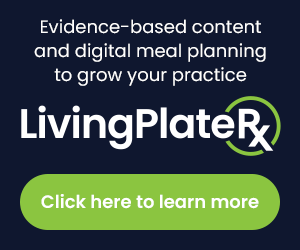▼ ADVERTISEMENT

|
Editor's E-Note
Herbal Medicine in Fertility
Whether offering complementary culinary zest, diffusing in a warm cup of tea, or delivering a potent punch in a concentrated supplement, herbs abound in the world of food and nutrition. Unlike foods supplying macro- and micronutrients, herbs are more often considered for their nonnutritive bioactive compounds, which may bring medicinal value. Nutrients from foods provide substrates and cofactors for thousands of important biochemical reactions taking place in the body. Herbal bioactives won’t provide those same metabolic foundations, but many can influence how those pathways perform for better or worse. June is men’s health month and an excellent time to explore how some herbs may impact men’s health, specifically related to male fertility and hormone levels.
After reading the article, visit TD’s website at www.TodaysDietitian.com to read the digital edition of our June/July issue, featuring a culinary-focused cover story with delicious recipes showcasing omega-3–rich fatty fish. You’ll also see digestive health front and center, with feature stories on intuitive eating in bariatric care and the latest science on food sensitivity assessment and management. Food additives are also a hot topic right now, and this issue will highlight the science every dietitian should know.
Please enjoy the E-Newsletter and give us your feedback at TDeditor@gvpub.com. Don’t forget to like us on Facebook and follow us on X, formerly known as Twitter.
—Heather Davis, MS, RDN, LDN, editor |
|
|
| In This E-Newsletter
|
|
▼ ADVERTISEMENT
 |
|
|
▼ ADVERTISEMENT

Herbs for Men’s Health
By Heather Davis, MS, RDN, LDN
Despite the increasing interest and use of herbal medicines for a variety of conditions and concerns, there remains a considerable research gap. Many unanswered questions exist regarding herbal metabolism, dose-dependent impact, and long-term effects. In addition, many studies looking at the medicinal properties of herbal bioactive compounds have been conducted in vitro and can’t offer as much conclusive insight into how these compounds behave in a more complicated metabolic setting in vivo. Nonetheless, some promising in vivo herbal studies exist that fan the fire of curiosity and spur investigation.
Some herbs are marketed for men’s health, including prostate health, hormone balance, and fertility. About 30% to 50% of infertility is related to male infertility and although reproductive diseases, lifestyle choices, and environmental (including nutritional) factors are among the main causes, researchers are asking how certain herbs might improve outcomes and if they have a valid place in the clinical arsenal for improving fertility in men.1
Mechanism of Impact
Experts offer several explanations for how some herbs may influence male fertility, including improving antioxidant status and reducing oxidative stress in sperm cells, increasing the number of testicular vessels, increasing the lifespan of sperm, and increasing sperm quality. It’s also possible that some herbs may enhance the activity of the hypothalamic-pituitary-gonadal axis, affecting the secretion of LH and testosterone.2
▼ ADVERTISEMENT
 |
Pregnancy Complications Contribute to Cardiovascular Risk for Overweight Women
Complications during pregnancy (or adverse pregnancy outcomes), like gestational diabetes and newly developed high blood pressure, act as nature’s stress test and may uncover an individual’s risk for heart disease later in life, according to new research published in the JACC, the flagship journal of the American College of Cardiology. The study also highlights how weight management before pregnancy may not only improve maternal health but also reduce future CVD risk.
The observational study, which tracked outcomes for women over more than 10 years, helps answer a key question: whether pregnancy complications contribute to cardiovascular risk or are just a marker for underlying risk factors that were there all along.
“Understanding the connection between adverse pregnancy outcomes and cardiovascular disease is important in the development of effective preventative strategies and determining the best timing for intervention to support long-term heart health,” says Jaclyn Borrowman, PhD, a researcher at Northwestern University and lead author of the study.
▼ ADVERTISEMENT
 |
HHS, FDA Offer Timeline for Phasing Out Petroleum-Based Food Dyes
In April 2025, the US Department of Health and Human Services and the FDA announced plans to phase out petroleum-based synthetic food dyes by the end of 2026, reports U.S. News. The initiative targets eight dyes, including Red No. 40 and Yellow No. 5, due to potential health risks. The FDA will revoke authorizations for certain dyes, approve natural alternatives, and collaborate with the National Institutes of Health to study additives' effects on children's health.
Eating More Ultraprocessed Food Ups the Risk of Premature Death
A recent study published in the American Journal of Preventive Medicine links ultraprocessed foods (UPFs) to an increased risk of premature death, reports CNN. Analyzing data from eight countries, researchers found that a 10% rise in UPF consumption correlates with a higher risk of early mortality. In the United States, UPFs were associated with approximately 124,000 premature deaths in 2018. |
CPE Monthly
Learn the effects of elevated blood homocysteine levels, known as hyperhomocysteinemia, on health and disease risk in this month’s issue of Today’s Dietitian. Read the CPE Monthly article, take the 10-question online test at CE.TodaysDietitian.com/CPEmonthly, and earn two CPEUs!
2026 Spring Symposium
Registration for our 13th annual Spring Symposium is now open! Take advantage of $249 Early-Bird Registration and plan to join us in Orlando, Florida, from May 17–20, 2026. This premier event offers a full array of learning opportunities and features fitness activities, networking, and exploration of new products. Additional details are forthcoming.
Share Your Expertise at the 2026 Spring Symposium
Want a chance to be a part of the Spring Symposium presenter line up? The 2026 Call for Abstracts is open—learn more and submit your proposal here!
|
Mindful Eating
YouAte is a mindful eating app that allows users to track meals through photos instead of calorie counts. By emphasizing thoughtful eating rather than abstract numbers, it supports behavior change and self-awareness around food choices. RDs can use the app to review clients’ food logs, encourage reflection, and identify patterns that affect health. The tool helps promote intuitive eating and building healthier, more sustainable habits. Learn more »
Real-Time Data
Kalix is a practice management platform designed specifically for dietitians and nutrition professionals. It offers features like secure telehealth, client charting, scheduling, billing, and customizable forms. The platform streamlines workflow, improves client communication, and enhances productivity, so it works well for both solo practitioners and group practices. With automation tools and integration options, Kalix helps RDs focus more on patient care and less on administrative tasks. Learn more » |
In the August/September Issue
• Dining Out in Nashville
• Today’s Dietitian 12th Annual Spring Symposium
• Dietitians and Human Trafficking
• Diabetes Management in Shift Work |
|
|
COVER STORY
SMASH the Omega-3 Gap
Omega-3s are vital at every age, yet most Americans don’t get enough. Although some of the richest food sources of omega-3s are fatty fish, many people may struggle to know how to prepare appealing dishes incorporating those options. Enjoy new and exciting recipes curated and shared by a dietitian.
FEATURE
Intuitive Eating in Bariatric Care
As dietitians explore intuitive eating with patients, questions arise about its role in bariatric settings. Discover how to adapt this approach for those who’ve undergone metabolic and bariatric surgery.
|
|
|
| Advertising Opportunities |
Have a product or service you want to market to nutrition professionals? Utilize the reach of Today’s Dietitian Magazine to accomplish your marketing goals. E-mail our experienced account executives today at sales@gvpub.com or call 800-278-4400 for more information.
|
| © 2025 Today’s Dietitian Magazine |
|
|